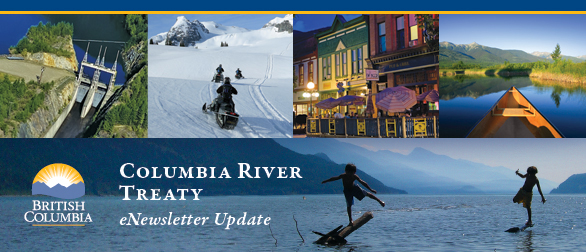Columbia River Treaty
Edition:

Treaty Review Question of the Month
How do climate change considerations impact the Columbia River Treaty?
Over the past century all regions in British Columbia have been getting warmer so that today temperatures are an average 1.2 degrees Celsius warmer than they were last century. Similar warming is projected to continue over the next century, across all seasons and all regions. There will be more precipitation in winter, spring and fall, with most Upper Columbia watersheds seeing an increase in water supply. The snowmelt will start earlier, spring and early-summer flows will peak earlier and be substantially higher. As well, late-summer and early-fall flows will be substantially lower and last longer.
The longer periods of low flows will coincide with periods when out-of-stream demands, such as for irrigation and recreation, are highest and in-stream demands, such as for hydroelectricity generation and fish habitat, are also important. Climate change projections for the Pacific Northwest indicate there is a need to prepare for increased frequency and unpredictability of extremes in weather at both ends of the spectrum for flooding and drought.
The extensive reservoir storage system of the Columbia Basin provides a mechanism that can assist in adapting to climate change challenges. Reservoirs will allow both Canada and the U.S. to shape flows by increasing storage during times of relative water abundance and releasing stored water during times of relative water scarcity. The coordination and flexibility contained within the Columbia River Treaty provide important mechanisms for the U.S. to help address some of the challenges climate change may bring.
More information about climate change and BC Hydro managed water resources can be found here.

